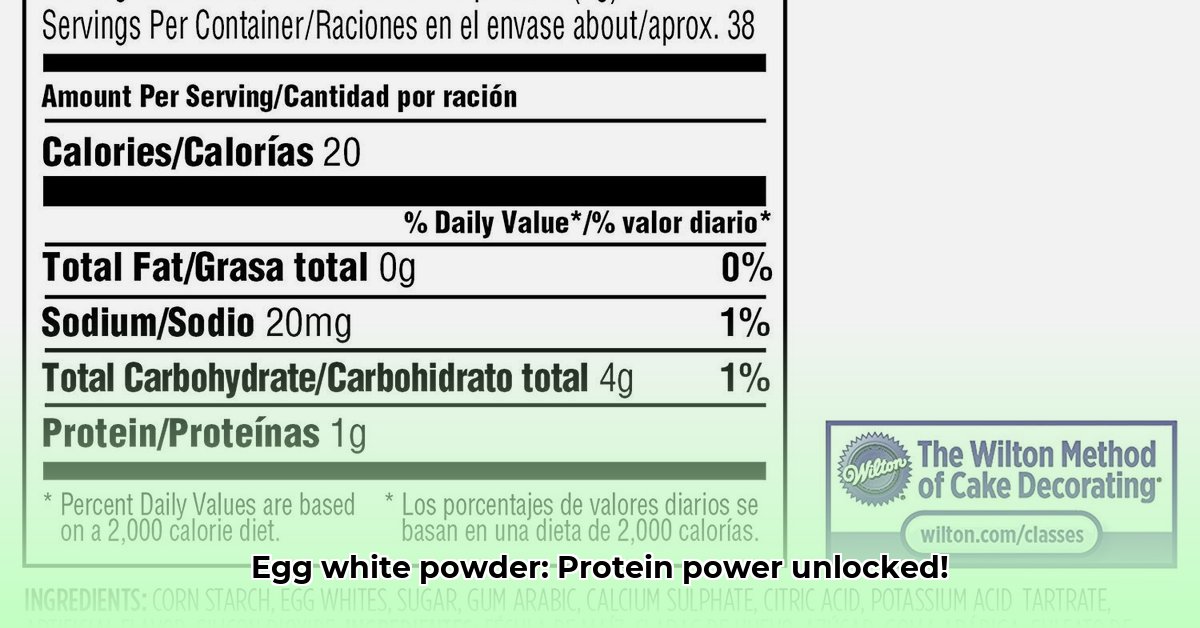
Egg white powder has become a popular supplement for athletes and health-conscious individuals seeking a convenient and efficient way to increase protein intake. This article provides a detailed analysis of its nutritional composition, benefits, potential drawbacks, and considerations for choosing a suitable product. For more information on egg white powder, check out this helpful resource: Egg white powder guide.
Egg White Powder Nutrition Facts: A Comprehensive Analysis
Egg white powder, as the name suggests, is a concentrated protein source derived from dried egg whites. Its nutritional profile is characterized by a high protein content and minimal fat and carbohydrates. However, the precise values can vary slightly between brands due to differences in processing and egg sourcing.
Macronutrient Profile: Protein, Fat, and Carbohydrates
Two independent sources (Source A and Source B) provide comparable data on the macronutrient content per tablespoon (approximately 7 grams) of egg white powder:
| Nutrient | Source A | Source B |
|---|---|---|
| Calories | 25 | 26 |
| Protein (grams) | 5.9 | 5.8 |
| Sodium (milligrams) | 90.9 | 87 |
| Potassium (milligrams) | 61.9 | 78.1 |
| Calcium (milligrams) | 7.1 | 6.2 |
As you can see, a significant portion of the calories originates from protein (approximately 89-95%). The low fat and carbohydrate content makes egg white powder suitable for various dietary approaches, including low-carb diets. However, it's important to note these values are estimates and may vary depending on the brand and manufacturing process.
Micronutrient Content: Vitamins and Minerals
While egg white powder excels as a protein source, its micronutrient profile is less extensive. It's relatively low in vitamins like vitamin D and vitamin C, and minerals like iron. This highlights the importance of integrating egg white powder into a balanced diet rather than relying on it as a sole nutritional source. A varied diet remains crucial for optimal health.
Amino Acid Profile and Potential Limitations
The precise amino acid profile of egg white powder requires further research. While it’s generally considered to contain a complete set of essential amino acids, the exact ratios and their bioavailability need more investigation. This means we don't yet have conclusive evidence on whether it provides the optimal balance of amino acids for maximal muscle protein synthesis.
The PRAL (Potential Renal Acid Load) score of egg white powder is relatively low, suggesting a minimal impact on the body's acid-base balance. This is a positive aspect, especially compared to more acidifying foods.
Benefits and Applications of Egg White Powder
Egg white powder offers several advantages, making it attractive to different groups:
Weight Management: Its high protein content promotes satiety, potentially aiding in weight loss efforts and assisting with muscle preservation during dieting.
Athletic Performance: It provides a convenient and quick way to increase protein intake, beneficial for muscle building, repair, and recovery after intense exercise.
Food Manufacturing: It acts as a valuable ingredient for enriching the protein content of various food products.
Potential Drawbacks and Precautions
Potential drawbacks to consider include:
Allergies: Some individuals may exhibit allergic reactions to egg whites, although this is not exceedingly common. Careful consideration of ingredient labels is crucial for individuals with egg allergies.
Contamination: The possibility of microbial or heavy metal contamination exists, though generally minimized through good manufacturing practices (GMP). Selecting reputable brands with robust quality control measures is recommended.
Ongoing Research and Future Directions
While our current understanding of egg white powder's nutritional benefits is substantial, further research is needed to fully elucidate its long-term effects. Key areas for future investigation include:
Comprehensive Amino Acid Analysis: A detailed analysis of the amino acid composition and bioavailability is essential for a comprehensive understanding of its role in protein synthesis and overall health.
Long-Term Health Impact: Longitudinal studies are needed to assess the long-term effects of egg white powder consumption on various health markers.
Choosing the Right Egg White Powder: A Guide
Choosing a suitable egg white powder requires careful consideration of several factors:
High Protein Content: Prioritize powders with a high protein concentration per serving (aiming for 20-25 grams or more).
Complete Amino Acid Profile: Look for products with a complete profile of essential amino acids, including branched-chain amino acids (BCAAs).
Low Sodium Content: Select low-sodium options to minimize potential health risks associated with excessive sodium intake.
Allergen Information: Carefully review ingredient labels for potential allergens, especially for individuals with egg allergies or sensitivities.
Mixability: Consider the ease of mixing, opting for products that dissolve readily without clumping.
Cost-Effectiveness: Compare prices per serving based on protein content to determine the most economical choice.
Third-Party Testing: Favour brands that undergo third-party testing to ensure purity and label accuracy.
By following these guidelines and conducting thorough research, consumers can make an informed decision when selecting an egg white powder that best aligns with their health and fitness goals.